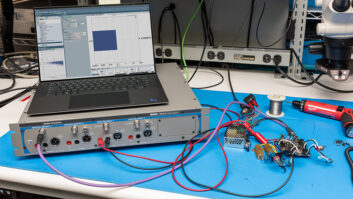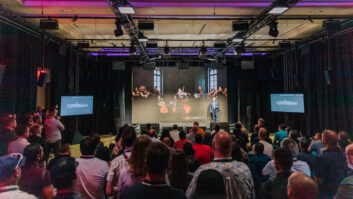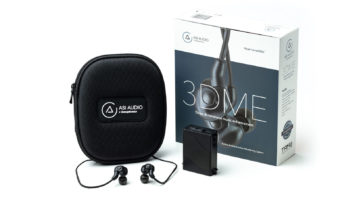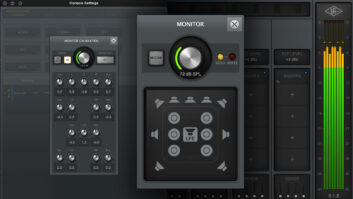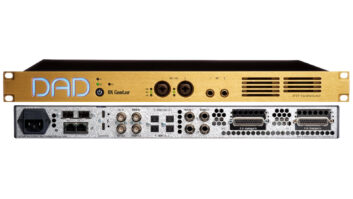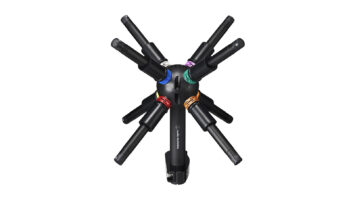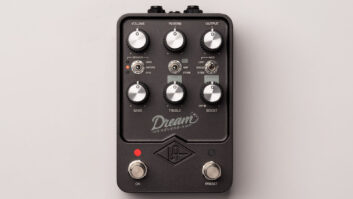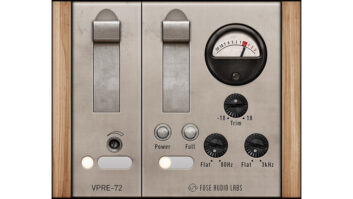I try to apply the same standards to my work that would be applied if every session I did wound up on the majors.
New Orleans. Partying. Syrupy-thick accents. Creole cooking. And all that jazz. Wanna leave the Gold Coast to produce music and live on the bleeding edge of the continuing technical revolution? “No thanks,” says Bay St. Louis, Miss., resident Pete Leoni. “Everything I need is right here at home.”
Leoni runs a project studio, Demotech Audio Labs, out of his home. He’s had some commercial success too, stretching all the way back to his work with songwriter Wanda Mallette back in the ’80s. “I had a demo studio back then that I ran out of the back room of a music store in Gulfport,” Leoni recalls. “I had a 1-inch Tascam 16-track that I synched to a Scully 1-inch 8-track recorder. Wanda, who I consider to be one of the finest songwriters in the country, co-wrote ‘Looking for Love in All the Wrong Places,’ the song Mickey Gilley turned into a big hit, as well as many other notable tunes. For about two years, she was in my place two days a week, writing and producing demos. Wanda and I got some time to write together and came up with a little tune called ‘We Still Shoot Horse Thieves in Texas.’ Country legend Mel Tillis got a hold of that demo and included it on his Coca Cola Cowboy album.
“Because of the success we had with these, I started to see a lot of songwriters wanting to get in on the action,” he continues. “At that time, with the advent of MIDI, it was just becoming feasible to do sessions electronically and save the cost of musicians. I synched up everything in sight! To make a long story short, I bought every damn keyboard, drum machine and sound module that came along, as soon as it came along! Of course, I had the early Apple stuff running sequences by this time. I began to get pretty dang good at doing high-quality demos for a fair price. Throw a couple of ad agencies wanting jingle production into the mix, and I guess you could say I was damned busy. So busy, in fact, that I was getting pretty burned out.”
Leoni took a job at a local casino as an entertainment director and checked out of the studio business for several years. By the mid-’90s, he was ready to jump back in. “Can you imagine not being plugged into the world of tech for about five years?” he asks. “As soon as I started to look around for gear, I was astounded to see that people were not taking the PC seriously as a recording platform! I was aware of what people had been doing on the Mac side, and I started looking into a Mac setup, but on further thought, it seemed to me that, with the PC practically taking over our lives, there was no way that people could continue to ignore the platform as a viable option for professional audio.”
E-mail and the Internet allowed Leoni to educate himself on computers and music. Along the way, he disabused himself of some accepted industry notions. “The innate superiority of SCSI over IDE, for example, was taken for granted,” he says. “I could see that assumption was wrong.” He began posting (and answering) questions on any audio-related news group he could find. Pretty soon, he found himself appearing in ad copy for companies like Antares, Cakewalk and Gadget Labs.
These days, Leoni relies almost entirely on a three-computer setup. All three are Q-Performance 850MHz Windows machines. One houses both Cakewalk 9 (“My favorite audio app, simple and rock stable.), Cubase 3.7 and a pair of Yamaha DSP Factory cards running the C-Maxx C-console interface.
A big Nemesys Systems GigaSampler fan, Leoni houses GigaStudio in his second computer outfitted with an Aardvark Ark 20/20 plus card, upgraded to 24-bit resolution. The two machines interface via Lightpipe.
Software synthesizers are the current rage, and Leoni dedicates his third computer to them. “I’ve got Cubase on this computer running a bunch of soft synths,” he explains. “In addition to a Frontier Dakota, I’ve got the Pulsar card from CreamWare. It’s quite a card, but it’s difficult to negotiate. The Pulsar has four SHARC DSP chips built into it. You can actually run soft synths right off of these chips. I Lightpipe out from the Pulsar back into computer one.”
Other equipment includes a Prosonus MP20 mic preamp (“One hell of a preamp for $500!”), his Mackie 16-channel VLX Pro console (“As far as I’m concerned, the pre’s on these Mackies are the closest thing you can get to a straight wire with gain.”) and a pair of Event 20/20 monitors.
Leoni also claims to have almost every plug-in on the market, with some of his favorites being the Sonic Timeworks 4080L — a 64-bit plug-in that he says sounds a lot like the Lexicon 480 on vocals. “I couldn’t master any project without using the Waves L1 Ultramaximizer,” he adds. “The Cakewalk FX3 Soundstage creates such realistic stereo tracks from a mono source that I sometimes record acoustic guitars with one mic and use it to create a stereo field. I also couldn’t work without the Antares AutoTune plug-in, and you know why.”
Leoni’s work, which includes lots of his own excellent keyboard playing and programming, features exceptionally clean, up-front vocals. “I don’t feel the need to have a huge mic cabinet like I did in the analog days,” he says. “I use a RØ;DE NT-1 and an NT-2 on vocals. To me, they sound like Neumanns without the hefty price tag. I find that they sound too warm for most other uses, though. My AKG 414 gets a lot of use. I especially like the way it tracks background vocals and piano. Sometimes, the tried-and-true is best. I use an AKG C-1000 on acoustic guitars and other stringed instruments, except the violin, where I use one of the RØDE mics. I try to apply the same standards to my work that would be applied if every session I did wound up on the majors. That kind of quality doesn’t go unnoticed in a smaller market.”
As for other project studio owners, the Web has made Leoni’s studio location less a factor than it might have been in the past. The Net even brought him in contact with his friend, and current business partner, Morgan Pettinato. The owner of the East Coast Music Mall, Pettinato was looking for a computer audio expert to help build and distribute a line of custom-built music machines. Scouring the Net for information, Pettinato kept coming across articles penned by Leoni. “He simply was the most knowledgeable person I found in the field of computer music who was actually using this equipment on a day-to-day basis,” says Pettinato. Their relationship led to the formation of Q-Performance Systems, which began shipping turnkey PC DAWs earlier this year.
If you can’t catch Leoni online, then just head over to Bootsie’s Brass Anchor in Waveland, Miss., where you’ll find him playing keys in a group that includes a bunch of guys from the old Dr. Hook band — three nights a week, just like he’s been doing for the past 20 years.
Gary Eskow is a contributing editor to Mix.
